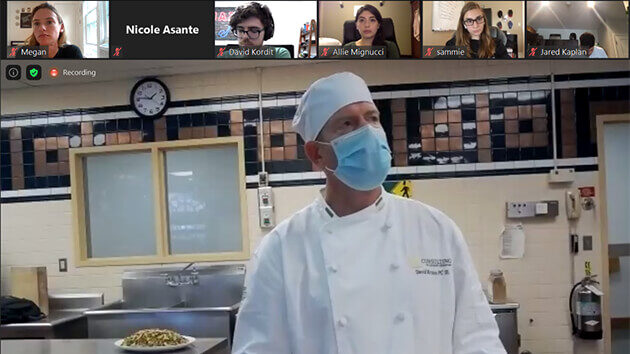Patients Cook Healthy Meals at Home, Coached by Clinicians

Meals inspired by the Culinary Institute of America, brought to you by... the doctor’s office?
The Bariatric and Nutrition Clinic has launched a revolutionary “medicine-to-table” teaching model that provides patients with step-by-step cooking demonstrations that they are now offering to their patients online. The program is designed to keep the clinic’s bariatric patients safe, well-nourished and on pace with their weight loss goals during the pandemic.
“So often, there is a disconnect between what a provider can relay during an office visit and what patients can put into practice when they get home,” said bariatric surgeon Jessica Zaman, M.D. “These classes help close that gap. And they’ve been especially helpful during the pandemic, allowing us to stay connected with our patients. Food is the ultimate way of bringing people together, after all.”
The clinic’s CHOP classes (“Cooking Healthy Options for Patients”) are unique to the Capital Region and are one of the things that set Albany Med’s Bariatric and Nutrition Clinic apart from other weight-loss programs in the area.
They are filmed inside a teaching kitchen that was unveiled at the clinic just prior to the pandemic. Originally intended to be presented in person, the demonstrations were converted to a virtual format last summer. They are led by medical students with input from Albany Med dieticians and nutritionists.
The students attend a two-day intensive healthy cooking class at The Culinary Institute of America in Hyde Park, as part of the College’s service-learning curriculum, which connects med students to community service. (During the pandemic, this training is offered remotely.)
Megan Freiburger, ’22, said the program has helped her hone her communication skills. “It’s taught me how to really listen to patients—a skill I know will be very important as a physician. There’s something very equalizing about cooking. It’s allowed for some very powerful conversations. The more we understand our patients, the better we can tailor treatment approaches that fit their lives.”
Rachel Woo, of Clifton Park, has regularly attended the classes, both in person and online, since her weight loss surgery in June 2019. A new mother, she said she appreciates the simplicity of the recipes, which yield great-tasting food and accommodate her busy lifestyle.
“They are protein-first, which is important for bariatric patients,” she said. “And the instructors really take the time to explain things. Why we’re braising a meat, for instance, instead of pan-frying it.”
Among the dishes on this year’s CHOP menu are Moroccan meatballs, white bean pumpkin chili and vanilla cheesecake parfaits.
Woo, a former culinary student, said she enjoys the back-and-forth with the clinicians. “We did figs stuffed with dates and blue cheese recently. I’m not a big blue cheese fan, so I suggested using goat cheese. I’ll chime in with substitutions. It’s a nice exchange.”
While classes are currently offered to patients at the Bariatric and Nutrition Clinic, there are plans to expand programming to the larger community, particularly the underserved.